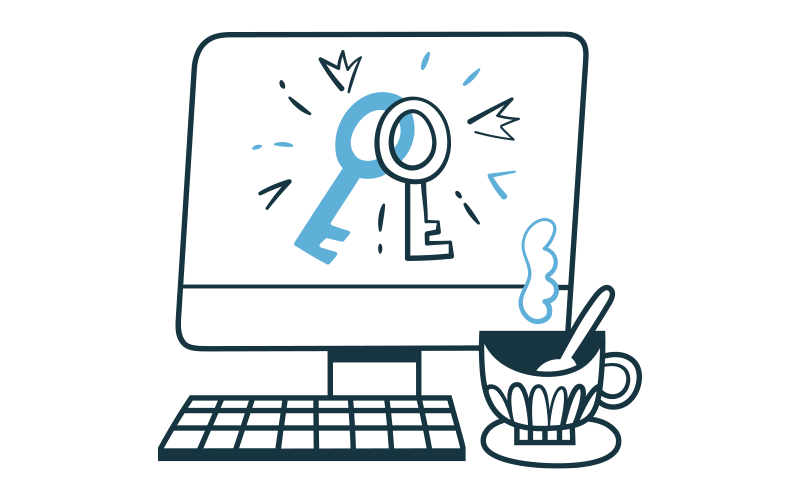
Intro to public sector data
Learn more about what public sector data is and how it's used in research.
Find out more about the Researcher Access Service - our platform for accessing secure public sector data for research.
This explainer is designed to help members of the public learn about Research Data Scotland’s (RDS) Researcher Access Service and how it enables faster, simpler access to public sector data for research in the public benefit.
The below information explains how the Service currently works, and will be updated as future iterations are released. More detailed information, designed for researchers and data professionals, can be found on the Researcher Access Service section of our website.
The Researcher Access Service is a digital service that makes it quicker and simpler for approved researchers to access de-identified public sector data for research.
Currently, the Researcher Access Service provides access to nine datasets around health, but we are working to expand to include other areas like education, social work, justice, and others through discussions with data controllers.
Launched by RDS in April 2024, the Service enables faster access to public sector datasets held in Scotland’s National Safe Haven – a Trusted Research Environment which securely houses some of Scotland’s most useful datasets for research.
Researchers need quick and secure access to good quality data so that they can generate insights that improve public policy and decision-making. This ultimately improves the lives of people in Scotland.
Previously, data was often locked away in lots of individual systems, across many different organisations, and not in a format that made access or integration easy. Accessing data could take too long, meaning research questions remain unanswered and policy is no longer fresh, innovative or even relevant.
The impact of this could mean delaying – or even missing – the chance to save time, money and lives.
The Researcher Access Service streamlines and simplifies the data access process so that researchers can access data faster, leading to more timely insights and enabling decision-makers to base their policies on good quality research built on good quality data.
The Researcher Access Service is a collaborative service developed and maintained by RDS and eDRIS (electronic Data Research and Innovation Service), which is part of Public Health Scotland, one of RDS’s founding partners. RDS has developed and continues to support the end-to-end digital service, while eDRIS colleagues work with researchers to guide them through the process. In addition, RDS works with several other partners to develop the Service and other systems across the Scottish data landscape. Find out more about our partners.
Since the outset, RDS has endeavoured to ensure that its users, including researchers, partners, and other data professionals, are a key part of the design process.
This means that the design and delivery of the Researcher Access Service has been through several stages of iterative development, with ongoing user consultation established as a fundamental part of the process.
The work undertaken has been accompanied by various stages of user feedback which, alongside forums like our Scotland Talks Data public panel, influence the priorities and direction of travel for our service development.
Find out more about how we developed the service by reading these blog posts:
The Researcher Access Service has been informed by existing knowledge from public dialogue, as well as feedback from our public panel.
In 2021 and 2022, ADR Scotland (Administrative Data Research Scotland) public panel sessions took place to help to shape and offer valuable feedback on the strategic direction of RDS. These panel sessions introduced some of the concepts for the development of what is now called the Researcher Access Service and offered panel members the opportunity to comment and question the approach.
The public panel feedback influenced the approach we have taken, how we communicate safeguards and the name of the service.
The public panel is now co-hosted by RDS and they continue to help shape the Researcher Access Service as it evolves. Learn more about the Scotland Talks Data public panel and their recent input in developing the service.
In addition to our direct public engagement activities, we have been informed by existing knowledge on what is important to the public when using public data.
As we develop future iterations of the service, we will continue to involve the Scotland Talks Data public panel and be informed by wider public engagement.
One way the Researcher Access Service improves access to public sector data is by introducing a simpler, digitised application process.
Data application systems are often confusing and inconsistent, sometimes requiring researchers to complete paper application forms and giving them no way to track their application. The Researcher Access Service simplifies this process by introducing the first fully digital platform for requesting datasets from the Scottish National Safe Haven, enabling researchers to submit and track their application from start to finish via an online portal.
The Researcher Access Service also makes it faster to access data by streamlining the approvals process for certain datasets.
Prior to the Researcher Access Service, most research projects that request access to Scottish health datasets had to be individually considered by the Public Benefit and Privacy Panel for Health and Social Care (HSC-PBPP) to ensure that the projects met requirements for demonstrating public benefit and proper information governance. Before the project was submitted to the panel, researchers worked with eDRIS to develop project requirements and prepare the application. However, these could be time-consuming processes and could lead to delays in researchers being granted access to data.
When an application is submitted via the Researcher Access Service, eDRIS assess the enquiry and decide the appropriate pathway for approving the application. This includes judging the application against a predetermined list of questions, such as:
If the project meets the criteria for the streamlined Researcher Access Service pathway, the application will be assessed by the Researcher Access Service Approval Panel, who will ensure that there are no risks or harms to individuals in the researcher accessing the data, the processing of the data is necessary, and that the proposed research is in the public good. The panel work in accordance with the Five Safes framework, outlined below.
If the Panel decide that the application is not suitable for the Researcher Access Service, it will follow the existing PBPP approvals process.
By introducing a risk-based assessment at the first stage of the approvals process, the Researcher Access Service enables faster access to data for certain projects, without compromising on the security of the data.
Public Health Scotland have enabled streamlined access to some of their most frequently requested datasets via the Researcher Access Service. Currently, the following nine datasets are available through the streamlined approvals process:
The most recent data available may vary per dataset, and more detail will be provided as part of the application process. More detailed information about these nine datasets can be found here.
The nine datasets initially available via the Researcher Access Service’s streamlined approvals process are some of the most frequently requested datasets controlled by Public Health Scotland. The datasets cover a wide range of topics, from large populations, over a relatively long period, meaning that they can enable lots of valuable insights.
Many other datasets can be accessed through the existing PBPP approval process, and you can explore these using the Metadata Catalogue.
As the Service develops, RDS are working with eDRIS/Public Health Scotland and other partner organisations to widen the number of datasets available through the Researcher Access Service’s streamlined approval process.
All the data available via the Researcher Access Service is held in the National Safe Haven – a Trusted Research Environment (TRE) which houses some of Scotland’s most useful public sector datasets.
TREs are highly secure digital environments that can only be accessed by approved researchers. Data cannot be taken out of a TRE. Instead, approved researchers do their research within a TRE before exporting their results, which are aggregated and checked to ensure that no sensitive data is included.
Learn more about Trusted Research Environments
To keep data secure within the TRE, the Five Safes framework is used. The Five Safes framework is a set of principles designed to ensure safe and secure access to data for researchers. For the Researcher Access Service, we have implemented the following requirements in accordance with this framework:
We're continually working to develop and improve the service to meet the needs of researchers. Our priorities include:
To stay up to date with future developments, subscribe to our monthly newsletter and follow us on LinkedIn. If you are a researcher or data professional who would like to get involved and help us shape the service, please join our engagement contact list or if you have any questions, get in touch.

Learn more about what public sector data is and how it's used in research.

Discover what the Five Safes framework is and how it's used to keep data secure.

Learn about Trusted Research Environments (TREs) and how they help researchers access data.
To stay updated with Research Data Scotland, subscribe to our monthly newsletter and follow us on X (Twitter) and LinkedIn.
